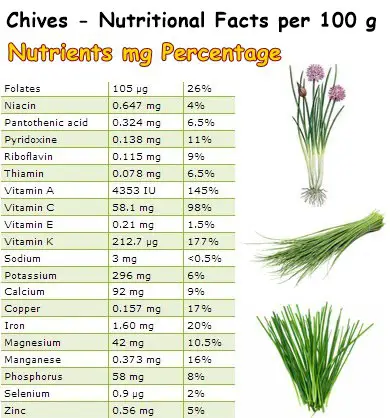Rich in vitamins A, C and K, folate and manganese, chives (Allium schoenoprasum) are a genuinely healthy addition to any diet. These grass-like tubular greens are not only full of flavor, but also extremely heart-friendly. Their high vitamin K content helps regulate the way our body deposits calcium, preventing both atherosclerosis and osteoporosis. Moreover, regular consumption promotes vasodilation, prevents blood clots and helps reduce the risk for cardiovascular events such as stroke.
Being an incredible source of vitamins A and K, chives are great for maintaining good eyesight and support various aspects of the immune function. As a result of its good vitamin C content, the vegetable boasts excellent antiviral and anti-inflammatory properties, helps keep arteries clean and protects against oxidative stress and cell damage. Lastly, chives exhibit an antioxidant and anti-aging action and help prevent anemia due to iron deficiency.

What are chives and what do they look like?
Chives are actually a type of onion, more tender and quite flavorful. They are erect, tubular, deep green and thin plants, with pale clustered purple flowers and small bulbs. They are usually harvested when they reach 15 cm in height, but can grow up to 50 cm. Chives are not garlic chives, nor scallions.
Are chives vegetables?
From a culinary point of view, chives are regarded as an herb and used to flavor different foods, from yogurt-based dressings to meat dishes. However, outside the world of fine cuisine, chives are considered a vegetable.
What do chives taste like?
Chives have a very mild (spring) onion taste. Seen their flavor is not as pungent as that of regular onions, they should be added to dishes at the end of the cooking process so they don’t lose all of their flavor due to heat. You can also use chives as garnish for various meat or vegetable dishes, salads and even rice. Although the bulbs, flowers and scapes (stems) are all edible, the scapes are preferred. They are considered one of the four ‘fine herbes’ of French cuisine, alongside chervil, parsley and tarragon.
Also see the benefits of tarragon.

What are the benefits of chives?
See what are the most noteworthy 10 nutrition facts and health effects of chives:
Benefits for blood pressure
Allicin, an organosulfur compound found naturally in chives, has been shown to release nitric oxide, a molecule responsible for dilating blood vessels. By dilating (widening) blood vessels, the allicin in chives lowers blood pressure. In addition to this, allicin prevents the formation of blood clots, thus reducing overall peripheral artery disease, coronary artery disease and stroke risks.
Cholesterol-lowering properties
Allicin was also shown to reduce cholesterol production by inhibiting the activity of a certain liver enzyme. However, keep in mind that allicin is produced immediately after chives are cut (or garlic is crushed) and persists for a limited period of time before being turned into other organosulfur compounds so you might want to serve your chives while they still ooze a pleasant onion-like fragrance.
Support blood coagulation processes
Chives are extremely rich in vitamin K (177% of the RDA). One of the main functions of vitamin K is activating blood coagulation processes which prevents hemorrhaging and ensures circulatory functions. However, if you are prone to blood clotting or have been prescribed anticoagulants, it is best to limit your consumption of vitamin K-rich foods.
Great natural antiseptic properties
The organosulfur compounds found naturally in chives, namely diallyl disulfide, diallyl trisulfide, allyl propyl disulfide, boast excellent antiseptic properties. Other vegetables with similar natural antimicrobial properties include white and yellow onions, white garlic, red onions and red garlic.
See the benefits of red onion.
Stimulates immunity
Chives are an excellent source of vitamin C, providing 98% of the RDA per 100 g of scapes. Vitamin C is great for stimulating the immune system due to its incredible antibacterial and antiviral properties. Moreover, chives provide us with 145% of the RDA of vitamin A, another incredibly potent immune system boosting nutrient. Vitamin A ensures the health of the mucous membranes at the level of the nose, mouth, throat, lungs and digestive tract, the parts of our body exposed to the outside world and thus in direct contact with potential pathogens.

Promote good eyesight
Rich in vitamin A as well as beta-carotene, chives ensure the health of our eyesight. Lutein and zeaxanthin, antioxidants with vitamin A activity, protect the macula lutea area and the retina from harmful free radicals from light and are said to contribute to lowering macular degeneration risks (loss of central vision).
Increase calcium absorption in bones
Chives are an incredible source of vitamin K, a nutrient known to increase calcium absorption in bones. By preventing hormonal imbalances leading to bone demineralization, vitamin K preserves bone integrity and bone health. Moreover, a healthy intake also prevents arterial calcification and its aftermath, atherosclerosis.
Reduce inflammation levels
Rich in vitamins C and K, two potent natural anti-inflammatory vitamins, chives are efficient at reducing inflammation levels levels in the body. According to research, high inflammation levels play a big part in the onset of chronic diseases such as diabetes, heart disease, cancer, neurodegenerative diseases etc.
Offer antioxidant protection
Chives abound in phenolic antioxidants, flavonoids, beta-carotene, lutein, zeaxanthin and contain important amounts of antioxidants vitamins and minerals, all of which protect cells against oxidative stress, a buildup of free radical damage. Oxidative stress has been linked to most forms of chronic illness ranging from diabetes, cardiovascular disease and cancer to dementia, Parkinson’s disease and chronic fatigue.
Help prevent neural tube defects during pregnancy
The high vitamin B9 (folic acid) content recommends chives for the prevention of spinal cord defects in newborns, also known as neural tube defects. However, because chives and all onion and garlic-type vegetables have an irritating effect on the stomach and often cause acid reflux and heartburn, it is best to eat them in small amounts during pregnancy.
Side effects and contraindications of Chives
However healthy they may be, chives, onions, spring onions, white, yellow or red onions and so many otherwise healthy foods (e.g. papaya, pineapple, peppers or garlic) might cause stomach upset with symptoms such as indigestion, nausea, vomiting, stomach pain, acid reflux, heartburn, bad taste in the mouth or bad breath and worsen gastritis and acid reflux by causing flareups of the conditions. Loose stools and diarrhea are other side effects associated with consumption of chives and other onion family vegetables.
Certain people are more sensitive to certain foods than others. While some cope well with pineapple and garlic, for example, others may have a hard time digesting them. Remember that what’s good for some people might not be good for you too. Just learn what foods your stomach is okay with and avoid or limit the foods that do not agree with you.
